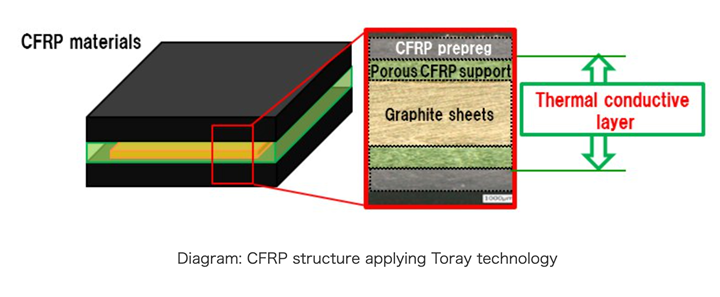Toray develops heat-dissipating CFRP material for flexible thermal management design
Internal graphite sheets and a porous, heat-conductive layer CFRP support attains a thermal conductivity above that of metals without compromising quality, properties.

Photo Credit: Toray Industries Inc.
Toray Industries Inc. (Tokyo, Japan) has developed a high thermal conductivity technology that lifts the heat-dissipating properties of carbon fiber-reinforced plastic (CFRP) to that of metals. Toray notes that applying this technology to CFRP dissipates heat effectively through thermal conduction paths inside that material, and, for example, can help suppress battery degradation in mobility applications while boosting performance in electronic device applications.
Efforts to enhance CFRP’s heat dissipation by employing external or internal graphite sheets led to excellent thermal conductivity, heat dissipation and diffusion. However, Toray notes, these sheets were easy to fracture, scatter and damage, compromising the performance of the CFRP material.
Over the years, Toray says it has used proprietary technology to develop and apply highly rigid porous CFRP-forming three-dimensional networks with short carbon fibers. On this occasion, Toray created a heat-conductive layer employing a porous CFRP support that safeguards the graphite sheets. Laminating CFRP prepreg on this thermally conductive layer reportedly enabled Toray to attain a thermal conductivity above that of metals, without compromising the mechanical properties and quality of that material.
Further, Toray says it made it possible to determine the thickness and lamination positions of graphite sheets forming thermal conduction paths. This enabled a flexible thermal management design, which controls the paths to release or use heat for CFRP cooling efficiency and heat diffusion paths.
Related Content
-
Plant tour: Teijin Carbon America Inc., Greenwood, S.C., U.S.
In 2018, Teijin broke ground on a facility that is reportedly the largest capacity carbon fiber line currently in existence. The line has been fully functional for nearly two years and has plenty of room for expansion.
-
Prepreg compression molding supports higher-rate propeller manufacturing
To meet increasing UAV market demands, Mejzlik Propellers has added a higher-rate compression molding line to its custom CFRP propeller capabilities.
-
Aerospace prepregs with braided reinforcement demonstrate improved production rates, cost
A recent time study compares the layup of a wing spar using prepreg with A&P’s TX-45 continuous braided reinforcement versus traditional twill woven prepreg.













